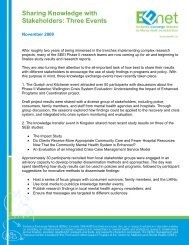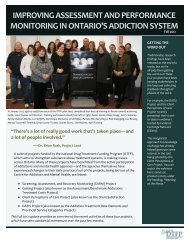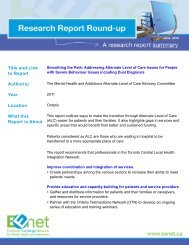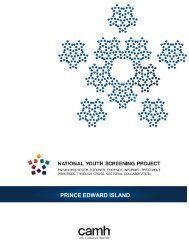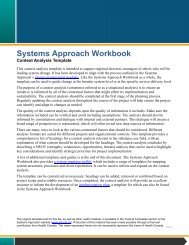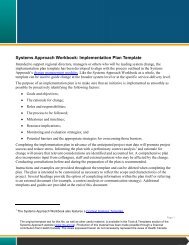Implementation of Early Psychosis Intervention Program ... - EENet
Implementation of Early Psychosis Intervention Program ... - EENet
Implementation of Early Psychosis Intervention Program ... - EENet
Create successful ePaper yourself
Turn your PDF publications into a flip-book with our unique Google optimized e-Paper software.
122. Family involvement in assessmentEPI programs should involve families during the assessment process, provided the client givesconsent.o High level <strong>of</strong> implementation with 83% <strong>of</strong> programs reporting being able to involve familiesin client assessment ‘most <strong>of</strong> the time’. Rates were lower for community agency sponsoredand small programs.o Challenges included scheduling and distances to travel, client resistance to familyinvolvement and mental illness within the family system.o Many programs (60%) indicated that their ability to deliver EPI would benefit from moretime to work with families.o Finding appropriate supports for family members with their own mental health needs wasidentified as important but can be difficult to address.3. Access to psychiatric assessmentThe EPI practitioner conducting the client assessment should have ready access to a psychiatristand the comprehensive assessment includes as a minimum a psychiatric exam and historyincluding assessing pre-morbid functioning and identifying co-morbid disorders.o The issue <strong>of</strong> access to psychiatry was queried in several places on the survey (e.g., also inpsychiatric medications treatment section).o Over 80% <strong>of</strong> programs reported that they can access psychiatrist expertise to support rapidintake or as part <strong>of</strong> the initial comprehensive assessment ‘usually’ or ’most <strong>of</strong> the time’.However, smaller programs reported lower implementation.o In addition to fee-for-service, about half <strong>of</strong> sites reported using sessional fees to paypsychiatrists.o Some programs reported putting considerable time and effort into developing andmaintaining relationships with psychiatrists.o About half <strong>of</strong> programs said their ability to deliver EPI would benefit from better access topsychiatry.o System level suggestions for creating easier access to psychiatrists included education toincrease the pool <strong>of</strong> psychiatrists familiar with the EPI model, more sessional funding andgreater use <strong>of</strong> telemedicine or a regional outreach service.4. Comprehensive (intake) assessmentEPI programs should <strong>of</strong>fer a comprehensive assessment which includes active engagement withthe client, assessing risk and presenting symptoms, assessing psychiatric, physical health andpsycho-social dimensions, and consideration <strong>of</strong> vocational, educational and occupationaldomains.o <strong>Program</strong>s reported that their comprehensive assessment ‘usually’ included a psychiatricexam, assessment <strong>of</strong> presenting symptoms, risk assessment, substance use assessment,developmental history, psychosocial assessment, cultural assessment, family information,review <strong>of</strong> client understanding.o Less frequently addressed were education and vocational issues.o <strong>Program</strong>s reported low frequency <strong>of</strong> providing a physical exam and neurological assessment,especially community agency sponsored and small programs.



